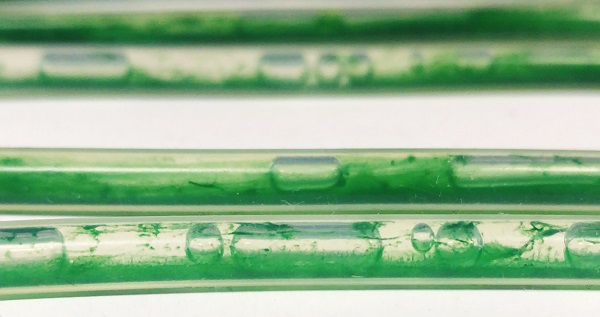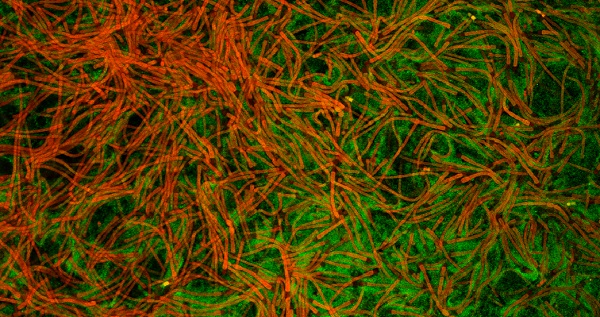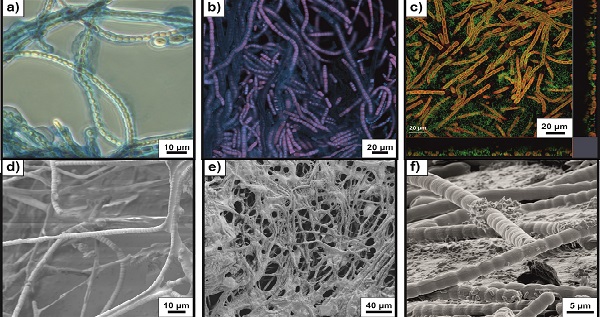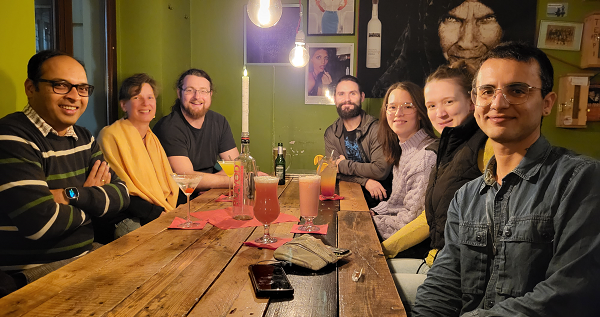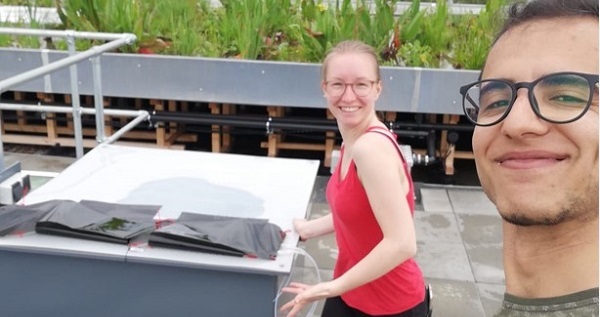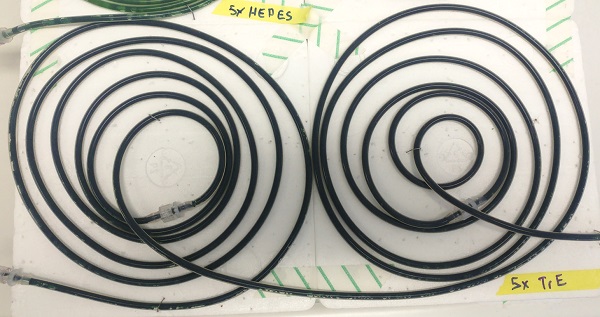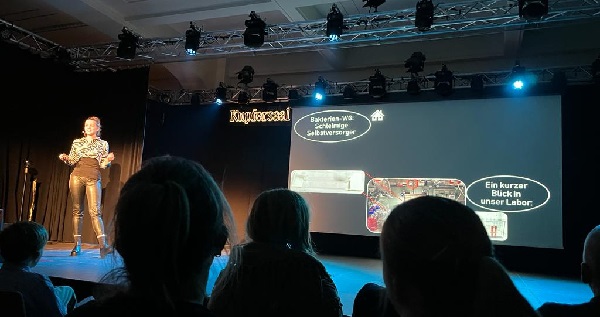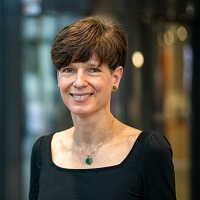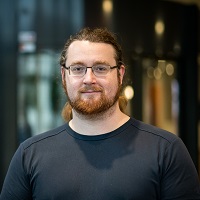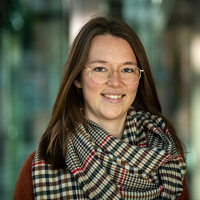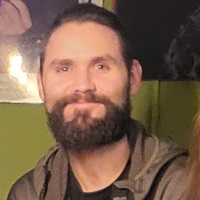Research Focus:
Biofilms are microbial communities growing attached at the interphase of aqueous systems. They are well known for causing problems in the medical and technical area due to their persistence against antibiotics or other bactericides leading to severe infections or efficiency losses. Our aim is the utilization of such naturally immobilized microbes as biocatalysts in continuous flow-through reactor systems, by turning their “problematic” characteristics into a benefit for catalysis. To achieve this goal it is essential to follow an interdisciplinary approach combining engineering and natural sciences. It is equally important to address biological questions like biofilm growth behavior, structure and physiology, as well as technical questions like reactor configuration, mass transfer issues and scale up. Therefore the `Catalytic Biofilms’ group is a team of biologists, biochemists and engineers, working on various questions related to the applicability of bacterial biofilms for biocatalysis. For more information please refer to the different topics.
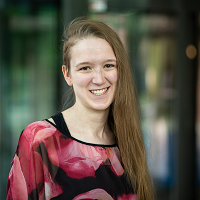
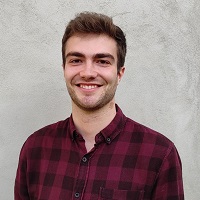
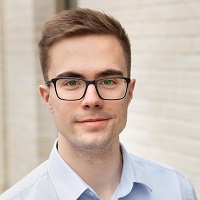

Index:
You could use our publication index for further requests.
2023 (6)
- Bozan, M., Schmidt, M., Musat, N., Schmid, A., Adrian, L., Bühler, K. (2023):
Spatial organization and proteome of a dual-species cyanobacterial biofilm alter among N2-fixing and non-fixing conditions
mSystems 8 (3), art. 00302-23 10.1128/msystems.00302-23 - Bühler, K., Lindberg, P. (eds., 2023):
Cyanobacteria in biotechnology: Applications and quantitative perspectives
Adv. Biochem. Eng. Biotechnol. 183
Springer Nature, 352 pp. 10.1007/978-3-031-33274-6 - Kenkel, A., Karande, R., Bühler, K. (2023):
Evaluating scaling of capillary photo‐biofilm reactors for high cell density cultivation of mixed trophies artificial microbial consortia
Eng. Life Sci. 23 (9), e2300014 10.1002/elsc.202300014 - Lindberg, P., Kenkel, A., Bühler, K. (2023):
Introduction to cyanobacteria
In: Bühler, K., Lindberg, P. (eds.)
Cyanobacteria in biotechnology. Applications and quantitative perspectives
Adv. Biochem. Eng. Biotechnol. 183
Springer Nature, p. 1 - 24 10.1007/10_2023_217 - Philipp, L.-A., Bühler, K., Ulber, R., Gescher, J. (2023):
Beneficial applications of biofilms
Nat. Rev. Microbiol. 10.1038/s41579-023-00985-0 - Toepel, J., Karande, R., Bühler, B., Bühler, K., Schmid, A. (2023):
Photosynthesis driven continuous hydrogen production by diazotrophic cyanobacteria in high cell density capillary photobiofilm reactors
Bioresour. Technol. 373 , art. 128703 10.1016/j.biortech.2023.128703
2022 (5)
- Bozan, M., Popp, D., Kallies, R., Nunes da Rocha, U., Klähn, S., Bühler, K. (2022):
Whole-genome sequence of the filamentous diazotrophic cyanobacterium Tolypothrix sp. PCC 7712 and its comparison with non-diazotrophic Tolypothrix sp. PCC 7601
Front. Microbiol. 13 , art. 1042437 10.3389/fmicb.2022.1042437 - Bozan, M., Schmid, A., Bühler, K. (2022):
Evaluation of self-sustaining cyanobacterial biofilms for technical applications
Biofilm 4 , art. 100073 10.1016/j.bioflm.2022.100073 - Bretschneider, L., Heuschkel, I., Bühler, K., Karande, R., Bühler, B. (2022):
Rational orthologous pathway and biochemical process engineering for adipic acid production using Pseudomonas taiwanensis VLB120
Metab. Eng. 70 , 206 - 217 10.1016/j.ymben.2022.01.014 - Scarabotti, F., Bühler, K., Schmidt, M., Harnisch, F. (2022):
Thickness and roughness of transparent gold-palladium anodes have no impact on growth kinetics and yield coefficients of early-stage Geobacter sulfurreducens biofilms
Bioelectrochemistry 144 , art. 108043 10.1016/j.bioelechem.2021.108043 - Scarabotti, F., Kuchenbuch, A., Kallies, R., Bühler, K., Harnisch, F. (2022):
Towards real-time determination of yield coefficients of early-stage electroactive biofilms using optical microscopy
Front. Energy Res. 10 , art. 920266 10.3389/fenrg.2022.920266
2021 (9)
- Bretschneider, L., Heuschkel, I., Ahmed, A., Bühler, K., Karande, R., Bühler, B. (2021):
Characterization of different biocatalyst formats for BVMO‐catalyzed cyclohexanone oxidation
Biotechnol. Bioeng. 118 (7), 2719 - 2733 10.1002/bit.27791 - Bretschneider, L., Heuschkel, I., Wegner, M., Lindmeyer, M., Bühler, K., Karande, R., Bühler, B. (2021):
Conversion of cyclohexane to 6-hydroxyhexanoic acid using recombinant Pseudomonas taiwanensis in a stirred-tank bioreactor
Front. Catal. 1 , art. 683248 10.3389/fctls.2021.683248 - Bretschneider, L., Wegner, M., Bühler, K., Bühler, B., Karande, R. (2021):
One-pot synthesis of 6-aminohexanoic acid from cyclohexane using mixed-species cultures
Microb. Biotechnol. 14 (3), 1011 - 1025 10.1111/1751-7915.13744 - Bühler, K., Bühler, B., Klähn, S., Krömer, J.O., Dusny, C., Schmid, A. (2021):
Biocatalytic production of white hydrogen from water using cyanobacteria
In: Rögner, M. (ed.)
Photosynthesis: Biotechnological applications with microalgae
De Gruyter, Berlin ; Boston, p. 279 - 306 10.1515/9783110716979-011 - Bühler, K., Krömer, J.O., Klähn, S., Bühler, B., Dusny, C., Schmid, A. (2021):
Weißer Wasserstoff made in Leipzig
Biospektrum 27 (3), 335 10.1007/s12268-021-1572-x - David, C., Karande, R., Bühler, K. (2021):
Cyanobacterial biofilms in natural and synthetic environments
In: Nielsen, J., Lee, S., Stephanopoulos, G., Hudson, P. (eds.)
Cyanobacteria biotechnology
Wiley, Weinheim, p. 477 - 503 10.1002/9783527824908.ch15 - Heuschkel, I., Hanisch, S., Volke, D.C., Löfgren, E., Hoschek, A., Nikel, P.I., Karande, R., Bühler, K. (2021):
Pseudomonas taiwanensis biofilms for continuous conversion of cyclohexanone in drip flow and rotating bed reactors
Eng. Life Sci. 21 (3-4), 258 - 269 10.1002/elsc.202000072 - Salamanca, D., Bühler, K., Engesser, K.-H., Schmid, A., Karande, R. (2021):
Whole-cell biocatalysis using the Acidovorax sp. CHX100 Δ6HX for the production of ω-hydroxycarboxylic acids from cycloalkanes
New Biotech. 60 , 200 - 206 10.1016/j.nbt.2020.10.009 - Scarabotti, F., Rago, L., Bühler, K., Harnisch, F. (2021):
The electrode potential determines the yield coefficients of early-stage Geobacter sulfurreducens biofilm anodes
Bioelectrochemistry 140 , art. 107752 10.1016/j.bioelechem.2021.107752
2020 (4)
- David, C., Heuschkel, I., Bühler, K., Karande, R. (2020):
Cultivation of productive biofilms in flow reactors and their characterization by CLSM
In: Guisan, J.M., Bolivar, J.M., López-Gallego, F., Rocha-Martín, J. (eds.)
Immobilization of Enzymes and Cells
Methods in Molecular Biology 2100
Springer Nature, p. 437 - 452 10.1007/978-1-0716-0215-7_30 - Heuschkel, I., Dagini, R., Karande, R., Bühler, K. (2020):
The impact of glass material on growth and biocatalytic performance of mixed-species biofilms in capillary reactors for continuous cyclohexanol production
Front. Bioeng. Biotechnol. 8 , art. 588729 10.3389/fbioe.2020.588729 - Mock, M., Schmid, A., Bühler, K. (2020):
Directed reaction engineering boosts succinate formation of Synechocystis sp. PCC 6803_Δsll1625
Biotechnol. J. 15 (11), art. 2000127 10.1002/biot.202000127 - Schäfer, L., Bühler, K., Karande, R., Bühler, B. (2020):
Rational engineering of a multi-step biocatalytic cascade for the conversion of cyclohexane to polycaprolactone monomers in Pseudomonas taiwanensis
Biotechnol. J. 15 (11), art. 2000091 10.1002/biot.202000091
2019 (5)
- David, C., Schmid, A., Bühler, K. (2019):
Cellular physiology controls photoautotrophic production of 1,2‐propanediol from pools of CO2 and glycogen
Biotechnol. Bioeng. 116 (4), 882 - 892 10.1002/bit.26883 - Heuschkel, I., Hoschek, A., Schmid, A., Bühler, B., Karande, R., Bühler, K. (2019):
Mixed-trophies biofilm cultivation in capillary reactors
MethodsX 6 , 1822 - 1831 10.1016/j.mex.2019.07.021 - Heuschkel, I., Hoschek, A., Schmid, A., Bühler, B., Karande, R., Bühler, K. (2019):
Data on mixed trophies biofilm for continuous cyclohexane oxidation to cyclohexanol using Synechocystis sp. PCC 6803
Data Brief 25 , art. 104059 10.1016/j.dib.2019.104059 - Hoschek, A., Heuschkel, I., Schmid, A., Bühler, B., Karande, R., Bühler, K. (2019):
Mixed-species biofilms for high-cell-density application of Synechocystis sp. PCC 6803 in capillary reactors for continuous cyclohexane oxidation to cyclohexanol
Bioresour. Technol. 282 , 171 - 178 10.1016/j.biortech.2019.02.093 - Mock, M., Schmid, A., Bühler, K. (2019):
Photoautotrophic production of succinate via the oxidative branch of the tricarboxylic acid cycle influences glycogen accumulation in Synechocystis sp. PCC 6803
Algal Res. 43 , art. 101645 10.1016/j.algal.2019.101645
2018 (2)
- David, C., Schmid, A., Adrian, L., Wilde, A., Bühler, K. (2018):
Production of 1,2-propanediol in photoautotrophic Synechocystis is linked to glycogen turn-over
Biotechnol. Bioeng. 115 (2), 300 - 311 10.1002/bit.26468 - Karande, R., Salamanca, D., Schmid, A., Buehler, K. (2018):
Biocatalytic conversion of cycloalkanes to lactones using an in-vivo cascade in Pseudomonas taiwanensis VLB120
Biotechnol. Bioeng. 115 (2), 312 - 320 10.1002/bit.26469
2017 (3)
- Halan, B., Vassilev, I., Lang, K., Schmid, A., Buehler, K. (2017):
Growth of Pseudomonas taiwanensis VLB120ΔC biofilms in the presence of n-butanol
Microb. Biotechnol. 10 (4), 745 - 755 10.1111/1751-7915.12413 - Schmutzler, K., Kupitz, K., Schmid, A., Buehler, K. (2017):
Hyperadherence of Pseudomonas taiwanensis VLB120ΔC increases productivity of (S)-styrene oxide formation
Microb. Biotechnol. 10 (4), 735 - 744 10.1111/1751-7915.12378 - Willrodt, C., Halan, B., Karthaus, L., Rehdorf, J., Julsing, M.K., Buehler, K., Schmid, A. (2017):
Continuous multistep synthesis of perillic acid from limonene by catalytic biofilms under segmented flow
Biotechnol. Bioeng. 114 (2), 281 - 290 10.1002/bit.26071
2016 (4)
- Halan, B., Karande, R., Buehler, K., Schmid, A. (2016):
Catalytic Pseudomonas taiwanensis VLB120ΔC biofilms thrive in a continuous pure styrene generated by multiphasic segmented flow in a capillary microreactor
J. Flow Chem. 6 (1), 39 - 42 10.1556/1846.2015.00037 - Karande, R., Debor, L., Salamanca, D., Bogdahn, F., Engesser, K.-H., Buehler, K., Schmid, A. (2016):
Continuous cyclohexane oxidation to cyclohexanol using a novel cytochrome P450 monooxygenase from Acidovorax sp. CHX100 in recombinant P. taiwanensis VLB120 biofilms
Biotechnol. Bioeng. 113 (1), 52 - 61 10.1002/bit.25696 - Karande, R., Schmid, A., Buehler, K. (2016):
Applications of multiphasic microreactors for biocatalytic reactions
Org. Process Res. Dev. 20 (2), 361 - 370 10.1021/acs.oprd.5b00352 - Schmutzler, K., Kracht, O.N., Schmid, A., Buehler, K. (2016):
Trophic regulation of autoaggregation in Pseudomonas taiwanensis VLB120
Appl. Microbiol. Biotechnol. 100 (1), 347 - 360 10.1007/s00253-015-7006-2
2015 (3)
- David, C., Bühler, K., Schmid, A. (2015):
Stabilization of single species Synechocystis biofilms by cultivation under segmented flow
J. Ind. Microbiol. Biotechnol. 42 (7), 1083 - 1089 10.1007/s10295-015-1626-5 - Lang, K., Buehler, K., Schmid, A. (2015):
Multistep synthesis of (S)-3-hydroxyisobutyric acid from glucose using Pseudomonas taiwanensis VLB120 B83 T7 catalytic biofilms
Adv. Synth. Catal. 357 (8), 1919 - 1927 10.1002/adsc.201500205 - Schmutzler, K., Schmid, A., Buehler, K. (2015):
A three-step method for analysing bacterial biofilm formation under continuous medium flow
Appl. Microbiol. Biotechnol. 99 (14), 6035 - 6047 10.1007/s00253-015-6628-8
There are always projects available within our research themes (see below). These projects might be interesting for students with a background in biotechnology, biochemical engineering, molecular biology or related fields.
Feel free to check the individual research topics of individual team members for more specific impressions on possible projects.
We offer challenging projects, careful supervision, excellent infrastructure and team spirit. Please feel free to contact us and ask for further details!
Utilizing microorganisms for the production of value added compounds
In this research field we are engineering bacteria towards synthesis of interesting chemicals. Respective organisms may either grow autotrophic utilizing CO2 as carbon source or heterotrophic using organic compounds (like glucose) as carbon source. Two basic routes are followed: Either the compound of choice is directly utilized from the growth substrate (fermentation), or the organisms are supplied with an additional substrate, which is transformed to a specific product (biotransformation).
Designing biofilms for continuous bioprocesses
In this research field we are utilizing surface attached bacteria (biofilms) as biocatalysts for continuous bioprocesses. Research questions to address are related to the biofilm response towards external stimuli, and the resulting architectural plasticity of the biofilm community. Especially stimuli connected to technical production systems, e.g. hydrodynamic conditions, substrate and/or product toxicity, etc., are in the focus of our work.
Development and characterization of mixed-species biofilms in a microfluidic flow-cell environment
Phototrophic microbial mats are structured, mixed-species biofilms that generally occur in nature. By effective utilization of solar radiation, they are able to concert the activity of different associated microorganisms. Furthermore, these mats are stable under extreme environmental conditions, making them highly attractive from biotechnological aspects to design robust and energy-efficient photo-biocatalytic processes.
In this context, we aim to understand the fundamental parameters needed to engineer such structured phototrophic microbial communities in biofilms. Here, different combinations of microbial species will be investigated to develop stable and structured microbial consortia with highly efficient light conversion.
The multispecies community will include i.e. the photoautotrophic strains Synechocystis sp. PCC 6803 M55 or Anabaena sp. PCC 7120, absorbing visible light and utilizing CO2 for biomass production. The photoheterotrophic strain, R. palustris, is used to absorb infrared light and utilize organic carbon (citrate/acetate) for biomass production, while the role of the chemoheterotrophic strain, Pseudomonas sp. VLB120, is to initiate biofilm formation and respire O2 produced by phototrophic strains. The proposed project will perform quantitative analysis of mixed-species biofilms in terms of surface coverage, stability, mass and energy fluxes in a flow-cell system.
ZEIT panel discussion "climate protection with H2" (in German)
Expert talk and panel "33. Kieler Energiediskurs" (in German)
Public climate school lecture (in German) (Video recording)
Interview with the agency for renewables (in German)
TU Dresden professor portrait (in German)
Studiengang Bioverfahrenstechnik
Vorlesung: Mikrobiologie für Verfahrenstechniker(innen) MW-VNT-51
Dozentin: Prof. Katja Bühler
Wann: SoSe wöchentlich Donnerstags, 09:20 - 10:50
Wo: TU Dresden, ZINT Campus (Bergstrasse 120), ZIN/120/H
Diese Vorlesung baut auf der Veranstaltung "Allgemeine Mikrobiologie" auf. Sie behandelt im ersten Teil den Abbau organischer und anorganischer Verbindungen und gibt einen Überblick über die häufigsten Gärungstypen immer im Zusammenhang mit biotechnologischen Anwendungen. Im zweiten Teil geht darum zu verstehen, wie man von einer Idee zu einem gewünschten Produkt kommt. Es werden Grundlagen in bakterieller Genetik vermittelt und aktuelle Techniken der Gentechnik behandelt.
Vorlesungsskripte und Lehrmaterialien (OPAL)
----------------------------------------------------
Vorlesung: Allgemeine Mikrobiologie MW-VNT-46
Dozentin: Prof. Katja Bühler
Beginn: WiSe wöchentlich freitags, 09:20 bis 10:50
Wo: TU Dresden, ZINT Campus (Bergstrasse 120), ZIN/120/H
Inhalte der Vorlesung sind die Grundlagen der Mikrobiologie. Dies umfasst: Aufbau von Bakterien, Viren und Pilzen, Ernährungsweisen, Wachstum, zentraler Kohlenstoff- und Energiemetabolismus, Organisation der Zellfabrik, Transportprozesse und einen Überblick über die biotechnologischen Anwendungsgebiete von Mikroorganismen.
Moritz Harter - finished his students internship with our group
Mahir Bozan - PhD candidate - now Postdoc at the UFZ
Amelie Kenkel - PhD candidate - now project manager HF GROUP
Valentina Schmitz - Master student - now PhD candidate with Bio-Mat

